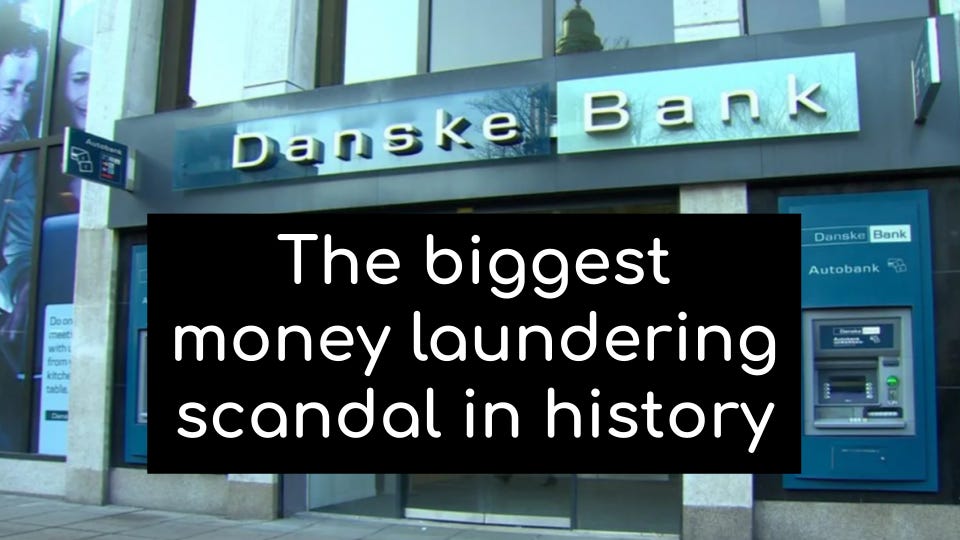The biggest money laundering scandal in history
At the time of writing, I have gone from having worked as a support engineer, department manager, sales engineer, project manager and management consultant to now having a job as a refuse collector, or bin man, as most people would probably call it.
The garbage collector job is the only full-time job I've been offered for more than three years, despite having applied for hundreds of positions. The explanation is probably that a waste management company does not consider it a major obstacle that a Google search of my name reveals that it could look like I'm a person who attacks nurses and on top is also a corona sceptic. Because that's what you can read about me by doing a simple Google search.
However, I will say that I'm happy to have a job where I do honest work, unlike some of the jobs I've held over the years. Take my last job, for example, where my engineering and MBA degrees and relatively long CV meant that I was a salaried employee, holding meetings and typing things into a computer. I was employed as a kind of project manager on a limited 1-year contract in the company Reckitt Benckiser at the Nordic headquarters in Gladsaxe in Copenhagen. The project was to split the company into two legally separate entities - one for their pharmaceutical products (RB Nordic Health A/S) and one for their household products (RB Nordic Hygiene A/S). At the time, the company had a turnover of around a quarter of a billion Danish kroner (DKK) but paid almost no tax locally in Denmark. This fact I only got interested in some time after I was hired. Initially, I was just proud to have landed a job for DKK 55,000 per month, my first higher-paying job after a long period of suffering from the after-effects of a period of stress. I went down with stress in 2017, when my then employer TACK International fired me after 3 days of stress illness. Boom, off you go! This is the behaviour of a consulting company whose core business is to train other companies' employees and managers. One of the reasons I went down with stress was that our consultant in Jutland had just gone down with stress, so I was asked to take our customers in Jutland with the result that I was commuting to Jutland every week with very long working days. It took me some time to recover from the stress illness, so it was very satisfying to land the job at Reckitt-Benckiser in October 2018.
At some point during my project employment at Reckitt Benckiser, I became aware that the company had settled a major lawsuit that is part of the opioid scandal that has particularly ravaged the US. Opioid is the name of the painkiller products that companies like Reckitt-Benkiser sold on the US market. The whole court case was ended internally by Reckitt Benckiser's CEO sending out an announcement to all employees that the company had reached a agreement with the US government to pay a settlement of USD 1.4 billion in a case of illegal marketing of a pharmaceutical product. The CEO makes it clear to all employees that no Reckitt Benckiser employees have done anything wrong, but that the settlement is being made to “protect its shareholders”. The paradox is that despite the settlement costing the company 1.4 billion US dollars, no employees were penalised, except for the internal whistleblower who started the case and who has long since had to leave the company! You can read about the settlement on the US Department of Justice website. [1]
When I found out I was quite shocked to work for a company that circumvented ethics and laws in such a cavalier manner. At the coffee machine, and during other one-on-one meetings with my colleagues, I tried to articulate that my integrity was affected by working in such a place. But as a project employee, I probably had less at stake than the permanent employees. In any case, I was very surprised to find that none of my colleagues were disgusted by the settlement and the way the case was closed by the company's CEO.
It's worth noting that while such cases of illegal marketing of pharmaceutical products are not entirely uncommon in the US, it is one of the larger cases. Equally relevant in the post-corona “voluntary” vaccine shutdowns, it's worth noting that Pfizer is the company that appears to have committed the biggest illegality in the field, settling an illegal marketing case in 2009 for the astronomical sum of 2.3 billion US dollars. This is the same company that in 2021 and beyond has made billions and billions from the corona pandemic. The case from 2009 can also be read about on the American Department of Justice's website, which refers to the case as the biggest fraud in history. [2]
Less than six months after Reckitt Benckiser's settlement, I was again shocked by a settlement reached in US litigation. The telecoms giant Ericsson, for whom I had previously worked in the Middle East, reached a similar settlement in December 2019 with the same Department of Justice as Reckitt Benckiser had done. However, in Ericsson’s case the opioid scandal had been replaced by a corruption scandal that involved a range of countries across continents. This time, however, the settlement amount was slightly lower, just over 1 billion US dollars, and this case can also be found on the Department of Justice website. [3]
Ericsson had apparently been involved in corruption cases in Egypt, China, Djibouti, Indonesia, Vietnam and Kuwait and had been forced to settle for over a billion US dollars. How many employees were fired from Ericsson because of this corruption scandal? You guessed it: None!
And while we're on the subject of international corporate crime, let's turn to Denmark’s number one bank in size and local familiarity: No Danske Bank employees lost their jobs as a result of the biggest money laundering case in World history? That's right, again: None! I remember a journalist asking an “expert” that very question and the answer was a big resounding “zero” with the explanation that the employees had probably already disappeared and were now working for other banks or other companies. The Danske Bank money laundering case has been labelled the biggest scandal in European history by the British newspaper The Guardian. Wikipedia calls it the possibly biggest money laundering scandal ever recorded. [4]
At the end of 2019, I told one of my best friends who had helped me through the aftermath of my stress illness that I would never again work as a salaried employee for an international company. He just shrugged his shoulders in resignation, probably thinking that the last bit of sanity had left me, that the goal must be full and that I was unlikely to ever get back on my feet. I don't know if he was thinking exactly like that, because we don't talk anymore, we disagree on too many things, and it's probably mainly me who has moved significantly in my opinions and sympathies since we got to know each other many years ago. But I am extremely grateful to him for all the help and support he gave me during a difficult time.
Now, you might sit and wonder: How come Ericsson had to pay 1 billion USD to the American Federal State in a settlement over corruption done in Egypt, China, Djibouti, Indonesia, Vietnam and Kuwait? And/or why Reckitt Benckiser had to pay 1,4 billion USD to the American Federal State over cheating the Americans on the street to buy their painkillers under false pretensions? And, in particular, why Danske Bank had to pay a settlement to the American Federal State over criminal money laundering done in Estonia?
My views on international companies and the laws and regulations under which they operate have made me very cynical about international trade and globalism. I believe that the market economy capitalist system as we know it has failed miserably. I don't want to just turn my thumb down on free market forces and capitalism, because the implementation we have today is something completely different from that: There exist no ‘free market forces’ as it is all controlled by a very small banking elite. I will return to this strongly in the section on the economic fiction in the sequel to this book, which is a book I have written with two other authors and which is called ‘The 3 Fictions’.
Links:
On 11 July 2019, Reckitt Benkiser settles with the Department of Justice regarding an opioid product: https://www.justice.gov/opa/pr/justice-department-obtains-14-billion-reckitt-benckiser-group-largest-recovery-case
Pfizer's settlement is described by the Department of Justice as the largest fraud case in history: https://www.justice.gov/opa/pr/justice-department-announces-largest-health-care-fraud-settlement-its-history
On 6 December 2019, Ericsson settles with the Department of Justice regarding corruption: https://www.justice.gov/opa/pr/ericsson-agrees-pay-over-1-billion-resolve-fcpa-case
In September 2018, The Guardian called the Danske Bank money laundering scandal the biggest in Europe: https://www.theguardian.com/business/2018/sep/20/danske-bank-money-laundering-is-biggest-scandal-in-europe-european-commission
The Danish Illusion is a reader supported publication.
If you do not feel like becoming a paid monthly subscriber, but want to support my work, you can buy me a cup of coffee for aprrox. 5 USD/35 DKK(click HERE!):















Share this post